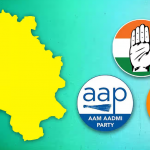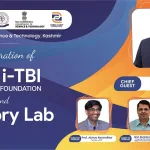Education is the cornerstone of societal progress and individual empowerment. However, in recent years, a growing trend has emerged in Jammu and Kashmir especially in the valley. The increasing dependency on expensive textbooks and stationery, this issue not only burdens parents financially but also contradicts constitutional and legal provisions aimed at ensuring equitable, quality education for all.
The Constitution of India guarantees the right to education through Article 21A, mandating free and compulsory education for children aged 6 to 14 years. The Right to Education (RTE) Act, 2009, further reinforces this by ensuring that education is a basic right. It mandates that every child has access to free and equitable quality education without discrimination. Moreover, Article 39(f) emphasizes providing children with opportunities and facilities to develop in a healthy manner and in conditions of freedom and dignity. The commercialization of education, driven by exorbitant textbooks, undermines these principles.
In a region like Kashmir, where socio-economic challenges already hinder access to quality education, the administration has a critical role in ensuring the enforcement of RTE provisions. Regulatory mechanisms must address the rising cost of textbooks and ensure that private schools adhere to guidelines regarding the selection and pricing of educational material. Without strict oversight, many students, particularly those from underprivileged backgrounds, are excluded from the education system.
The National Education Policy (NEP) 2020 which has already been implemented in J&K, emphasizes reducing the curriculum load and fostering conceptual understanding rather than rote learning. It advocates for affordable and accessible resources development of high-quality textbooks in multiple languages at low costs.it is also advisable to encourage the use of digital resources and open educational resources (OERs) at higher grades. The emphasis should be on Prioritizing experiential and skill-based learning over heavy reliance on textbooks.
The ground reality in J&K however contradicts these ideals. Many private schools compel parents to purchase expensive books, often from specific publishers, which are beyond the comprehension level of young learners. This not only violates NEP 2020 but also hinders the child’s natural learning process.
In Kashmir, education has increasingly become a commercial enterprise. The imposition of expensive textbooks and stationery disproportionately affects middle and lower-income families, forcing many parents to compromise on other basic necessities to meet these demands. This trend alienates thousands of children from the dream of quality education and perpetuates inequality. To address this grave concern there is a need for the enforcement of certain regulations. The administration must strictly enforce RTE guidelines regarding free and compulsory education.
Introduce caps on textbook prices and mandate the use of government-approved textbooks.Promotion of Open Educational Resources (OERs) could be promoted at larger scale.The system must encourage the use of digital and free resources that align with the curriculum.Training of teachers can be a game changer.Training of teachers including the private school teachers to use innovative and cost-effective teaching methods will really open new horizons for the teachers and students.
There is also a need for Parental awareness campaigns to educate parents about their rights under RTE and NEP 2020.This will emphasize that quality education is not synonymous with expensive books and materials. It is very important to establish committees to review and approve textbooks based on affordability, content quality, and age-appropriateness.
Similarly, the stakeholders must encourage local publishing which will also generate employment opportunities for the talented academicians of kashmir.People must support local publishers in creating cost-effective textbooks tailored to the regional context and curriculum. Lastly, there is a need to have accountability for Schools as they must justify their choice of textbooks and prove adherence to affordability and quality standards. Administration must impose penalties on schools that mandate the use of non-approved, overpriced books.
It is very basic and logical to understand that education is a right, not a privilege. The commercialization of textbooks in J&K, if unchecked, will only deepen socio-economic divides and derail the vision of inclusive, equitable education outlined in the Indian Constitution and NEP 2020. The administration, educators, and parents must work collectively to ensure that the focus shifts back to quality, burden-free learning, enabling every child to realize their potential without financial or academic hurdles.
(Author is independent columnist and academician. He can be reached at [email protected])








